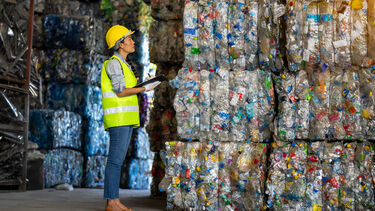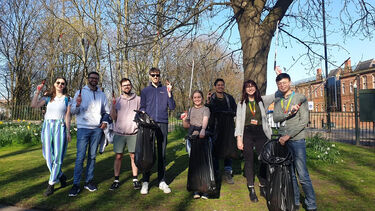Plastic pollution remains a major environmental challenge, and while alternative materials are emerging, there is no single solution. This World Environment Day 2025, which focuses on ending plastic pollution, the University of Sheffield highlights the steps we are taking to reduce plastic use and waste on campus. At the same time, researchers are investigating long-term alternatives to conventional plastics - from developing biodegradable materials to promoting reuse and strengthening recycling systems.
Research
Reimagining plastic
Researchers at the University of Sheffield are exploring innovative alternatives to conventional plastics through cutting-edge research. As part of the recent Festival of Debate, Professor Tony Ryan, Co-Director of the Grantham Centre for Sustainable Futures, introduced the concept of neo fossils - plastics made from agricultural waste instead of fossil fuels. These materials not only reduce reliance on finite resources but also help remove carbon dioxide from the atmosphere, offering a sustainable path forward in the fight against climate change.
Developing sustainable, biodegradable alternatives
A research project in the School of Mathematical and Physical Sciences is tackling the environmental challenges posed by traditional plastics in agriculture by developing sustainable, protein-based films from waste materials. Waste products that will be used include rapeseed meal, digestate from biogas plants, and poulty feather waste - all of which are underutilised waste from farming. The team will develop two main products: a mulch film and an edible fruit preservation coating with the hope to replace traditional plastic films.
Encouraging reusable packaging
The University is actively involved in the BUDDIE-PACK project, a collaborative effort with European partners. This project delves into the practicality of implementing reusable plastic packaging solutions on a larger scale. By analysing consumer behaviour and identifying convenient, reusable options, BUDDIE-PACK aims to significantly reduce reliance on single-use plastics.
Making sure alternatives are better for the environment
University of Sheffield researchers have revealed that plastic products can sometimes generate lower greenhouse gas emissions compared to non-plastic alternatives. This is due to factors such as lower energy consumption during plastic production and the lightweight nature of plastic materials. The study emphasises that the most effective strategies for reducing plastic's environmental impact lie in optimising use, extending product lifespans, and improving waste collection systems. In some situations, we need to stop demonising plastics.
Campus
Zero waste shop
The Sheffield Students' Union's innovative Zero Waste Shop empowers students and staff to embrace sustainable living. This shop offers a wide variety of unpackaged food items, ranging from basic staples like rice and pasta to various herbs and spices. It also promotes reusable products, allowing customers to purchase reusable coffee cups, refill their washing up liquid containers, and even enjoy a vegan pick-and-mix selection. The Zero Waste Shop tackles plastic waste reduction head-on, while simultaneously promoting responsible food consumption.
Comprehensive recycling systems
Recognising the significant amount of waste generated on campus, the University has implemented a robust recycling programme encompassing various materials. This programme includes designated bins for batteries, books, catering equipment, lab equipment and coats, mixed recycling, various plastics, mobile phones, electrical equipment, and more. By facilitating proper waste segregation and recycling, the University ensures a more sustainable waste management system.
Helping staff and students remove plastic from the local environment
The University makes it easy for staff and students to get involved and organise litter picks on campus and beyond! Earlier this year, several teams came together across campus for the Big Spring Clean.


